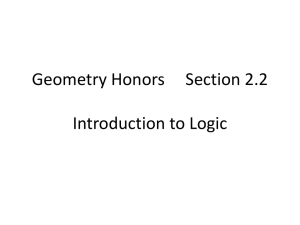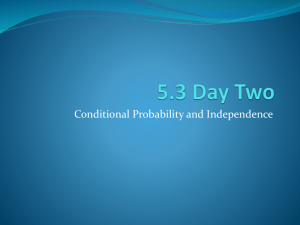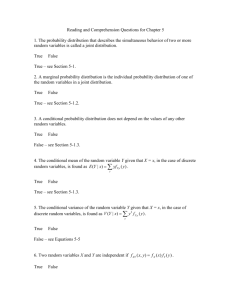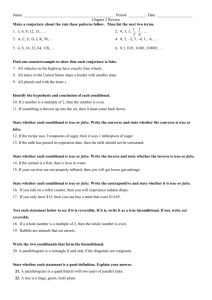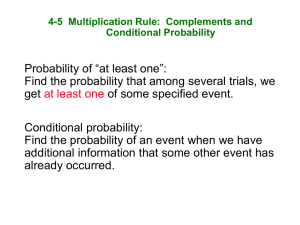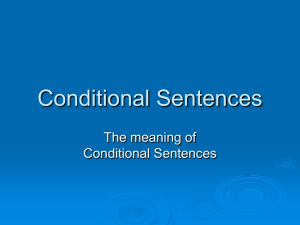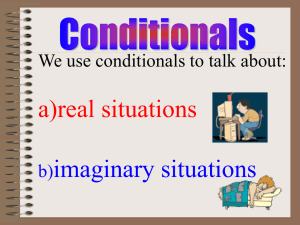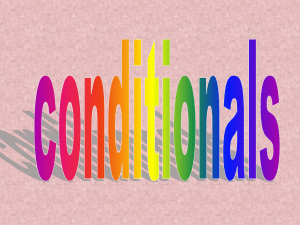Conditionals DLA
advertisement
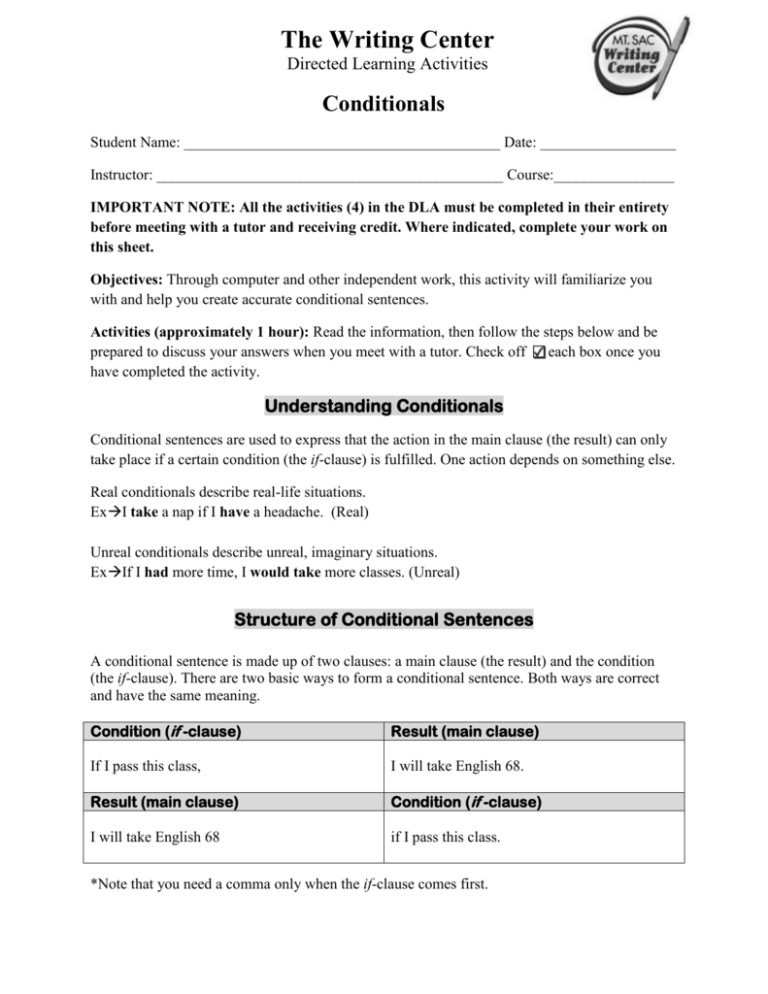
The Writing Center Directed Learning Activities Conditionals Student Name: __________________________________________ Date: __________________ Instructor: ______________________________________________ Course:________________ IMPORTANT NOTE: All the activities (4) in the DLA must be completed in their entirety before meeting with a tutor and receiving credit. Where indicated, complete your work on this sheet. Objectives: Through computer and other independent work, this activity will familiarize you with and help you create accurate conditional sentences. Activities (approximately 1 hour): Read the information, then follow the steps below and be prepared to discuss your answers when you meet with a tutor. Check off each box once you have completed the activity. Understanding Conditionals Conditional sentences are used to express that the action in the main clause (the result) can only take place if a certain condition (the if-clause) is fulfilled. One action depends on something else. Real conditionals describe real-life situations. ExI take a nap if I have a headache. (Real) Unreal conditionals describe unreal, imaginary situations. ExIf I had more time, I would take more classes. (Unreal) Structure of Conditional Sentences A conditional sentence is made up of two clauses: a main clause (the result) and the condition (the if-clause). There are two basic ways to form a conditional sentence. Both ways are correct and have the same meaning. Condition (if -clause) Result (main clause) If I pass this class, I will take English 68. Result (main clause) Condition (if -clause) I will take English 68 if I pass this class. *Note that you need a comma only when the if-clause comes first. DLA: Conditionals 2 Zero Conditional: Facts & General Truths We use the zero conditional when the result of the condition is always true, like scientific facts or general truths. We are not thinking about the future or the past, or even the present. We are thinking about a simple fact. With the zero conditional, the condition always has the same result. You could also use this conditional to give advice, to talk about ability, or to give instructions. We use present tenses to talk about the condition. We use the present tenses, the imperatives, or modals to talk about the result. If you heat water to 100°C, it boils. (simple present) If you visit London, you should get an Oyster Card. (modal) Buy tickets online if you want to get discounts. (imperative) The power goes out if too many people are using a lot of electricity. (present progressive) First Conditional: Real Future Possibilities We are talking about the future. We are thinking about a particular condition or situation in the future, and the result of this condition. There is a real possibility that this condition will happen. We use the simple present tense to talk about the possible condition. The important thing about the first conditional is that there is a real possibility that the condition will happen. We use simple present to talk about the condition, and future tenses or modals of future possibility to talk about the possible future result. You are going to fail the class if you don’t do the work. (certainty) If you pass the exam, I’ll buy you dinner. (certainty) I may go to UCLA if I qualify. (possibility) If he gets low grades, he might not get a scholarship. (possibility) If you get a raise, we could go to Hawaii on vacation. (possibility) DLA: Conditionals 3 Second Conditional: Untrue or Imaginary Situations The second conditional can be used to talk about imaginary/impossible present situations, where we are imagining something different from what is really the case. We can also use it to talk about things in the future that are unlikely to happen, as the condition is unlikely to be met. We use the past tense in the condition part and would/might/could + base form of the verb for the result. If I had more time, I would read more. (certainty) (I don’t have more time, so I don’t read.) If you played the lottery, you might have a chance to win. (possibility) (You don’t play, so you can’t win.) We could travel around the world if we were* rich. (ability) (We’re not rich, so we can’t travel.) *For present/future unreal conditionals, you should always use were, not was. Third Conditional: Impossible Past We use the third conditional to talk about a condition in the past that did not happen. That is why there is no possibility for this condition. The third conditional is also like a dream, but with no possibility of the dream coming true. The important thing about the third conditional is that both the condition and result were impossible. We use the past perfect (had + past participle) tense to talk about the impossible past condition, and would/could/might + have + past participle to talk about the impossible past result. If it had rained yesterday, we would have canceled the picnic. (It didn’t rain yesterday, so we didn’t cancel the picnic.) I could have given you a ride if I had known you needed it. (I didn’t know that you needed a ride, so I didn’t give you one.) I might not have bought this computer if I had read its reviews online. (I bought the computer because I didn’t read the reviews.) DLA: Conditionals 4 Mixed Conditionals Sometimes unreal conditional sentences are mixed. This means that the time in the if-clause is not the same as the time in the result. There are many possibilities, but here are a few examples: Past Present If I had won the lottery, I would be rich. Present Past If I knew Chinese, I would have translated the letter for you. Future Present If you were giving that speech tomorrow, you would be very nervous right now. Future Past If I weren’t going on that trip next week, I would have accepted that new assignment. Using Unless The word unless basically means the same thing as if ... not. Unless you study, you will fail. = If you do not study, you will fail. Unless is often used in conditional sentences. It can be used with the zero, first, second, or third conditional. Here are some examples. Zero Conditional: I stay up late unless I have to work early the next morning. = I stay up late if I do not have to work early the next morning. First Conditional: You'll be unhappy unless you break up with her. = You'll be unhappy if you do not break up with her. Second Conditional: I wouldn't ask her out unless you told me it was OK. = I wouldn't ask her out if you told me it was not OK. Third Conditional: They wouldn't have come over unless we'd invited them. = They wouldn't have come over if we had not invited them. DLA: Conditionals 5 1. Review the information on this sheet. Then, answer the following questions. What is a conditional sentence? ______________________________________________ _________________________________________________________________________ What are the four types of conditionals? ________________________________________ _________________________________________________________________________ 2. Open your internet browser and go to http://esl.about.com/library/quiz/bl_conditionals1.htm. Complete the online Conditionals test by choosing the correct answer. Click “Next Question” until you finish all items. After you finish, PLEASE COPY AND PASTE THE PAGE THAT HAS YOUR SCORE. DO NOT EXIT THE PROGRAM UNTIL YOU HAVE PASTED THAT PAGE HERE. 3a. Collect some of your graded work. Find and write down examples of sentences that contain the following conditionals: 1. Zero Conditional:_________________________________________________________ _______________________________________________________________________. 2. First Conditional: ________________________________________________________ _______________________________________________________________________. 3. Second Conditional: _______________________________________________________ _______________________________________________________________________. 4. Third Conditional: _______________________________________________________ _______________________________________________________________________. If you do not have your own essay to work with, please complete the supplemental activity below (3b). DLA: Conditionals 6 3b. Match the following conditions and results. The first set has been done for you. If I had seen Sue, unless I drink coffee in the morning. I would never have met you he would buy a house. I could have had a better job I would have given her the check. People should turn off unused electronics if they want to save money on their electricity bills. If Paul had more money, we’ll go to the beach. If you want to get a good grade, if I were taller. I might go to the movies tomorrow if I had stayed in my native country. I could play basketball professionally study, get tutoring, and do your homework. Unless it rains, if I have enough time. I get a headache if I had finished my studies. 4. Complete the following sentences with their missing conditions or results. Remember to pay close attention to the conditional types (zero, first, second, or third) and their corresponding verb forms. 1. If I hadn’t come to the U.S., ________________________________________________ _______________________________________________________________________. 2. ________________________________________________________________________ ______________________________________________________if I fail my next exam. 3. _______________________________________________________________________ ___________________________________________if you need more grammar practice. 4. If I were super rich, _______________________________________________________ _______________________________________________________________________. 5. I will take AMLA 33 unless ________________________________________________ _______________________________________________________________________. DLA: Conditionals 7 6. ________________________________________________________________________ ______________________________________________________we would stay home. 7. _______________________________________________________________________ _________________________________________________if I hadn’t taken this class. 8. Attend some Writing Center workshops if _____________________________________ _______________________________________________________________________. 5. Review: Sign up to see a tutor here http://mtsac2.mywconline.com/. During your session with a tutor, explain your work to demonstrate your understanding of conditionals. Refer to your own graded writing (or the completed activity) and explain to the tutor strategies that you used to create conditionals. Student’s signature: ______________________________________________ Date: __________ Tutor’s signature: ________________________________________________ Date: _________ IMPORTANT NOTE: All the activities (4) in this DLA must be completed in their entirety before meeting with a tutor and receiving credit. If your instructor wants evidence of this completed DLA, please do these two things: 1.) Check your e-mail for a copy of the tutor’s notes on this tutorial. 2.) Print out your DLA from the whiteboard in the online tutoring session. To print the DLA, click the button with two arrows in the upper right hand corner. Then export the whiteboard to Word.
